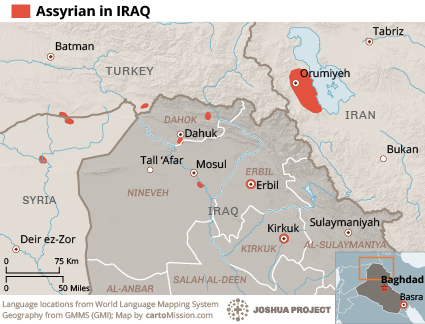Assyrians are an ethnic group whose origins lie in what is today Iraq, Iran, Turkey and Syria, but who have migrated to the Caucasus, North America, and Western Europe during the past century.
They are believed to descend from the ancient Akkadians, who, starting with Sargon of Akkad, emerged as the ruling class of Assyria. Babylonia (formerly Sumer and Akkad) was a colony of Assyria. Eventually, Aramaean tribes assimilated into the Assyrian empire and their language became dominant, while the different cultures merged to form the ancient Assyrian culture. Today, in certain areas of the Assyrian homeland, identity within a community depends on a person's village of origin (see List of Assyrian villages) or Christian denomination, for instance Chaldean Catholic.
Most Assyrians speak a modern form of Syriac, an Eastern Aramaic language whose dialects include Chaldean and Turoyo as well as Assyrian. All are classified as Neo-Aramaic languages and are written using Syriac script, a derivative of the ancient Aramaic script. Assyrians also may speak one or more languages of their country of residence.
As a result of persecution, mostly during the 20th century, there is now a significant Assyrian diaspora. Major events included the Islamic revolution in Iran, the Simele massacre, and the Assyrian genocide that occurred under Ottoman Turkish rule in the early 1900s. The latest event to hit the Assyrian community is the war in Iraq. Of the one million or more Iraqis reported by the United Nations to have fled, forty percent are Assyrian, despite Assyrians comprising only three to five percent of the Iraqi population.
People often greet and bid relatives farewell with a kiss on each cheek and by saying "Peace be upon you." Others are greeted with a handshake with the right hand only; according to Middle Eastern customs, the left hand is associated with evil. Similarly, shoes may not be left facing up, one may not have their feet facing anyone directly, whistling at night is thought to waken evil spirits, etc.
There are many Assyrian customs that are common in other Middle Eastern cultures. A parent will often place an eye pendant on their baby to prevent "an evil eye being cast upon it".
There are Assyrians who are not very religious, yet they may be very nationalistic. Assyrians are proud of their heritage, their Christianity, and of speaking the language of Christ. Children are often given Christian or Assyrian names such as Ashur, Sargon, Shamiram, Nineveh, Ninos, Nimrod, etc. Baptism and First Communion are heavily celebrated events similar to how a Bris and a B'nai Mitzvah are in Judaism. When an Assyrian person dies, three days after burial, people gather to celebrate that person's rising to heaven (as did Jesus). After seven days they again gather to commemorate their passing. A close family member wears only black clothes for forty days or one year as a sign of respect.
Assyrian culture is dictated by religion. The language is also tied to the church as well for it uses the Syriac language in liturgy. Festivals occur during religious holidays such as Easter and Christmas. There are also secular holidays such as Akitu (the Assyrian New Year).
In Iraq, Assyrians have managed to navigate communal violence and discrimination for many years.
Pray for God s protection for Iraq s Assyrian minority.
Pray for the Holy Spirit to move powerfully in Assyrian churches, drawing them close to the King of kings.
Pray that the Lord will show them the way to share Christ with Iraq s Muslim population.
Pray for biblically based discipleship.
Scripture Prayers for the Assyrian in Iraq.
Vilbert Famil-Elia
| Profile Source: Joshua Project |












